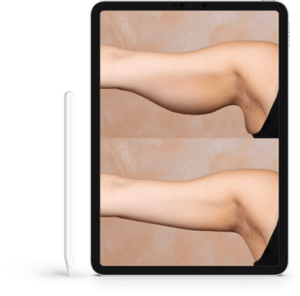Brachioplasty in Brussels with Dr Ballieux
Brachioplasty, also known as inner arm lift, consists of reducing the excess fat or skin on your arms. This procedure allows for the permanent removal of excess skin and fat. Following this procedure, you will obtain a harmonious and firm contour. Choose Dr Ballieux for your brachioplasty in Brussels and you will obtain a long-lasting result.
The brachioplasty procedure is performed after a weight loss and allows to efficiently remove important excess skin and fat.
This procedure leaves a vertical scar on the inner arm that will gradually fade to become a thin white line.
Contact Dr Ballieux
The brachioplasty technique in Brussels
In order to obtain a harmonious and thinner contour, Dr Ballieux combines arms liposuction with excess skin removal.
The incision is longitudinal and is located along the inner side of the arm. It isn’t visible from the front or back. The average duration of this procedure is about an hour and a half.
During preoperative appointments, Dr Ballieux identifies and defines the extent and topography of the excess skin and fat, in collaboration with the patient.
Frequently asked questions from our patients about a brachioplasty procedure in Brussels with Dr Ballieux
Undergoing a brachioplasty procedure in Brussels is a decision that must be well thought out. We gathered advice and most important information to know about this surgical procedure. If you have any further question, contact Dr Ballieux through our online contact form.
After a brachioplasty procedure in Brussels
Dr Ballieux performs brachioplasty in Brussels as an outpatient procedure and under general anesthesia. After the procedure, the patient must wear a compression garment day and night during 4 to 6 weeks. Recovery after any surgical procedure generally follows this timeline :
- During the 3 first postoperative days, it is common for patients to experience minor swelling. In order to reduce this discomfort, Dr Ballieux prescribes oral analgesics.
- A postoperative visit takes place 3 to 6 days after the procedure.
- The return to work generally takes place two to three weeks after the procedure. Within this time frame, most patients are able to resume their everyday activities. However, we do not recommend driving for 24 to 48 hours after surgery.
- Physical activity: We also recommend you to avoid any major physical activity during 1 to 2 months.
Risks and complications linked to a brachioplasty procedure
Any surgical procedure, even a minor one, carries risks. Indeed, any surgical act remains subject to hazards of the living tissues of the organism, whose reactions are totally unpredictable.
Therefore, a surgical procedure can cause bruises, swellings, bleedings or even infections.
A distinction must be made between complications related to the anesthesia and those related to the surgical procedure performed. Although rare, the latter will be exposed during preoperative consultations. Among the risks are a temporary alteration of skin sensibility, an infection if you don’t do your care with a nurse as well as a risk of bleeding if you carry weight. Risks and complications differ depending on the surgical correction performed.
Do I have to stop taking certain medications before the procedure ?
Some over-the-counter and prescription medications can cause pre- and post-operative complications. Therefore, we recommend you to stop taking medications containing aspirin or any related or similar molecule two weeks before the surgery. This recommendation also applies to anti-inflammatory drugs and anticoagulants. Indeed, those can be responsible for increased bleeding during and after surgery.
In addition, we do not recommend taking vitamin E medications or protein powders two weeks before your procedure. During a surgical procedure under general anesthesia, we also recommend you to avoid herbal medicines such as echinacea, ephedra, garlic, ginseng, ginkgo, kava, St. John’s wort or valerian. Indeed, these components may alter the effectiveness of anesthetics, prolong bleeding and interfere with proper healing after surgery. If in doubt, consult Dr Ballieux to know if you should stop taking your medication.
The issue of tobacco and its effects
Scientific data are now unanimous about adverse effects of tobacco in the context of a surgical procedure. These multiple effects mainly consist of significant scarring complications or failure of the procedure. In order to limit any post-operative complications, Dr Ballieux recommends ceasing smoking 6 to 8 weeks before your brachioplasty in Brussels.
The cost of a brachioplasty procedure in Brussels
The costs indicated include all costs related to the operation: surgeon’s fees, operating assistance, hospitalization costs, equipment used and pre- and post-operative follow-up. However, these costs are not contractual and cannot be precisely defined due to the difficulty of the operation and the particularities of each patient.
Our photo gallery
Dr Ballieux makes a digital photo album available to patients in consultation.
You can also find Dr Ballieux on Instagram! @dr.fannyballieux

We worked together at Westmead Children’s Hospital. Dr. Ballieux is a passionate doctor.
Martin Gott
Contacter le Dr Ballieux

